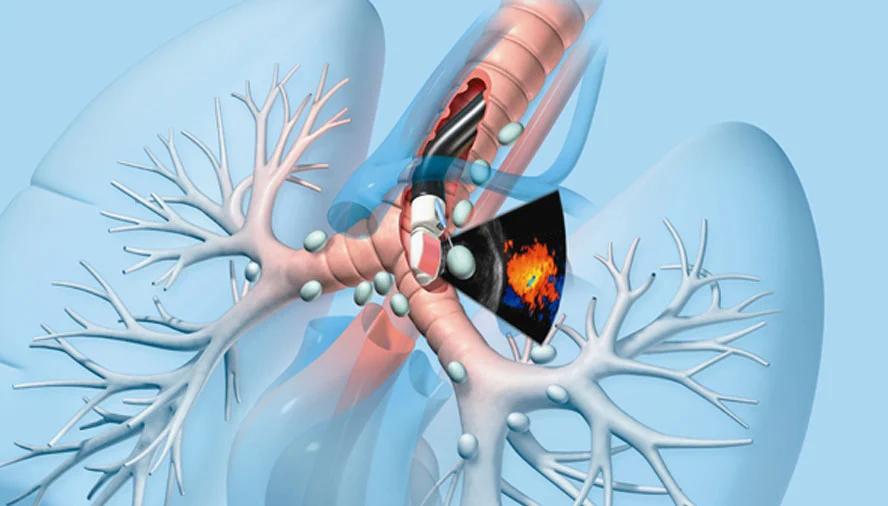Tuberculosis: Symptoms And Causes
Tuberculosis, often known as TB, is one of the serious infectious diseases all over the world. This very old disease...
Free Toll Call on
Booking Contact Number
Personal Contact Number

Endobronchial Ultrasound (EBUS) is a cutting-edge, minimally invasive bronchoscopy procedure designed for the precise diagnosis and staging of mediastinal lymph node enlargements. Primarily utilized in lung cancer cases, EBUS proves equally effective in diagnosing other cancers originating from various parts of the body, such as the bowel (Esophageal and Colonic), kidney, and sporadically, gynecological tumors.
For further information, you may consult our best pulmonologist in Dubai and get expert advice.
The procedure employs a flexible telescopic camera device, resembling a pencil with an attached ultrasound processor tip. This instrument navigates through the patient’s mouth, windpipe, and into the smaller tubules of the lungs. The dual imaging capability provides an endoscopic view inside the airways and an ultrasound image outside the airways.
Post imaging, tissue samples are collected from the lesion outside the airways using a thin needle called Transbronchial Needle Aspiration (TBNA). EBUS is generally well-tolerated, with minimal complications—occasional cough and sore throat, which quickly subside.
If you want to know about EBUS procedure cost, feel free to consult us for detailed information and assistance.
Know More: Breathing Troubles?
Endobronchial Ultrasound-guided Transbronchial Needle Aspiration (EBUS-TBNA) is a contemporary technique specifically designed for tissue sampling of lymph nodes or lesions adjacent to the airways. This method is really effective in diagnosing conditions, including lung cancer and benign conditions like Sarcoidosis, Tuberculosis, and fungal infections.
Take advantage of Endobronchial Ultrasound in Dubai for enhanced diagnostic capabilities and improved patient care in respiratory medicine.
Know More: Lung Cancer Screening
Rapid on-site evaluation during EBUS-TBNA, known as ROSE, enhances diagnostic accuracy. This real-time assessment of collected samples ensures a definitive pathological diagnosis, streamlining the diagnostic process and minimizing the need for multiple biopsy passes.
During an EBUS-TBNA procedure with ROSE, the patient lies in a supine position while the physician, assisted by nurses, targets a specific lymph node station for biopsy. The procedure, usually performed with mild sedation and local anesthesia, involves careful adjustment of the bronchoscope position and needle insertion. Suction is applied to collect viable samples, which are rapidly stained and evaluated for accurate diagnosis and staging.
Know More: Impact of Vaping on Lung Health
While EBUS is generally safe, rare complications may include bleeding from the biopsy, hoarseness of voice, low oxygen levels, and a small risk of lung collapse. However, these occurrences are infrequent.
Choosing EBUS-TBNA offers several advantages for patients:
Know More: Everyday Health Risks of Air Pollution
After EBUS-TBNA with ROSE, patients are monitored for at least an hour, with continuous assessment of vital signs. Mild sedation may require a longer observation period before discharge. Patients may experience a scratchy throat or hoarseness, but these side effects typically resolve within a few hours.
Recovery involves staying in the recovery area until the numbing agent wears off, allowing the patient’s gag reflex to return to normal. Discharge is permitted once the effects of sedation have diminished. If you are seeking the best pulmonologist in Dubai, having a companion is recommended for driving and overnight stay to ensure optimal recovery.
Tuberculosis, often known as TB, is one of the serious infectious diseases all over the world. This very old disease...
Pulmonary stenosis is a serious condition that restricts blood flow from the heart to the lungs, making it harder for...